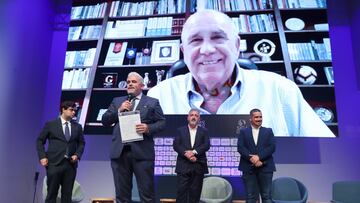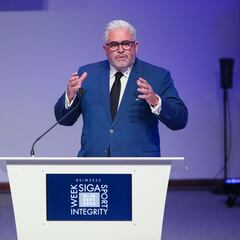SIGA Sport Integrity Week: Day 4 summary: standards fundamental for the future of sport
SIGA’s Sport Integrity week covered fighting piracy, the challenges and opportunities of sport betting and UEFA’s commitment to integrity on its final day.


The fundamental importance of integrity and values in sport was, once again, the core message as the Sport Integrity Week summit, held in Cascais, Portugal by the Sport Integrity Global Alliance (SIGA), reached its conclusion on Thursday.
Day 4 of the hybrid event, featuring in-person and remotely connected speakers, continued to address a wide range of topics promoting all facets of integrity and transparency in sport.
This newspaper is a proud media partner of SIGA and fully supports the organisation in its mission to foster greater integrity throughout Sport.
Sport Integrity Week Daily Summary - Day 4
The following is the daily summary of Thursday’s conference from SIGA:
SIW 2022 ended on a high note, with digital attendees and in-person participants celebrating the signals confirming SIGA’s role in reforming Sport with Integrity.
SROC and ACT signed with SIGA an Anti-Piracy Pledge, calling “on the European Union to address the issue of piracy and particularly live content piracy”, as “piracy continues to drain Europe’s creative and cultural ecosystems, sports and live performance sectors, depriving workers and industries of billions in annual revenues”.
Football has also shown strong alignment with SIGA mission and vision. UEFA’s president, Aleksander Ceferin, joined in remotely to reaffirm the commitment of the European Football governing body to the agreement signed with SIGA in 2019. “European football has overcome the obstacles beyond the boundaries of the Sport itself. We must lead by example. When we established the partnership with SIGA, Emanuel Macedo de Medeiros called us trailblazers of the Integrity of Football. I invite everyone to follow our trail. In UEFA, our member associations and other stakeholders, you will always have a supportive and reliable partner in the quest to tackle assaults on Sport Integrity, and advance in good governance, ethics and Youth Protection.”
Moving from continental to local level, the stakeholders involved in Portuguese professional football also paired with SIGA to seal an integrity pact. Portuguese League, referee’s association, players’ union and coaches association said yes, becoming pioneers of a mission that will soon expand to other countries.
Gender, race, inclusion & diversity – GRID awards
The day opened with a keynote by Brian Lewis, President, SIGA GRID Standing Committee, and CANOC. Demanding “zero tolerance for discrimination, regardless of the form”, Lewis flagged the need to shift global culture, and remembered that “if you can acknowledge the problem, you can fix it”.
Daniela Bas was next on stage and shared an insightful view on Sport and Inclusion, surprising the attendees with inspiring examples, right before joining the first round table of the day.
Kate Hamer, AxisStars, hosted a panel on diversity and inclusion. Paul Elliott (English FA), spoke about diversity as a “key element” in the world.
According to the head of the FA’s inclusion office, 45 per cent of the Premier League is made up of black players, so this percentage needs to be reviewed regarding the coaching staff and management positions.
Arun Kang (Sporting Equals) also mentioned the lack of diversity in management positions, which, according to him, should lead to concrete initiatives. Kang encouraged organizations operating in the area to get involved, and congratulated SIGA for being committed to equality, while showing a willingness to lead the change.
Following a video on equality promoted by Sky Sports, Yath Gangakumaran, commercial director of the station, spoke of how Sky broadcasts both male and female events, and how even the company itself can grow by bringing new people from various backgrounds into its audience.
IMMAF’s Densign White, who is also SIGA Vice-Chair, explained how mixed martial arts have worked to bring people from various parts of the globe into decision-making positions, including how its founding requires representatives from all continents.
Matt McCann, founder of Access Earth platform, left an alert: it is crucial to ensure the integration of fans. He agreed if fans come from various backgrounds, so should representatives in the Sport. However, it is essential “to go even further” to educate people, help governments and support communities, and give everyone equal access.
Daniela Bas mentioned how sometimes small attitudes could change the way people think. According to Bas, it is necessary to follow “basic rules”, namely respect for all cultures, which are more mixed than ever in the various sports worldwide. Daniela Bas also spoke of how we still have a long way to go, and exemplified with info that there are still countries in the world with no access to women’s toilets in schools or sports halls.
Keith Jones, founder of Soul Touchin’ Experiences, joined remotely to leave a note: it is necessary that children with any disability can have the same opportunities as any other.
The conference ended with a short conclusion, where the whole panel reached a consensus: action plans need to be put in place.
The experts’ panel was followed by the launch of a ground-breaking initiative on inclusion:
The SIGA GRID awards.
Every year, SIGA will confer recognition on the following categories:
- Sports Organisation of the Year (inclusive of clubs, federations, leagues, players’ unions, etc)
- Sports Business of the Year
- Broadcaster of the Year
- Social Media Campaign of the Year
- Executive of the Year
- Inclusive Sports Event of the Year
- GRID Champion of the Year (individual athlete)
- Lifetime Achievement Award
Digital Piracy
Introducing the SIGA expert forum on Intellectual Property rights protection & anti-digital piracy, Emanuel Macedo de Medeiros, SIGA’s Global CEO, left a message of resilience – “I will not hesitate to tell the truth: sport is under threat, its’ future is under threat”, he said – setting the tone for the two roundtables that followed.
The first one focused on “Protecting the Sport’s industry from digital piracy: the state of play”. Moderated by Laura Vilches, Sport and Media Law Expert, the roundtable focused on deliberating on the fight against piracy.
Lawyer Jan Nordemann highlighted the need for the fight against piracy in live events to be done within minutes, as the product’s value is concentrated between the kick-off and final whistle. Matthew Hibbert highlighted the difference between the resources of pirates and the entities fighting them. More money needs to be invested in this fight. Marco Giorello called for greater collaboration between partners to combat this inequality, highlighting the importance of national authorities.
Roundtable 2 then took the stage, discussing “What the European Union can & should do”, resulting in a conversation focusing on the future.
Diogo Guia, ICSS, moderated, and began by equating the fight against corruption with the defence of human rights. and launched the debate with the need “to be very ambitious in the goals”. With strong words, Grégoire Polad called for political action: “It’s not easy. If it was easy we would do it for ourselves”. After criticizing political inaction as the fight against piracy cannot be used as an electoral trump card, Association of Commercial Television and Video on Demand Services in Europe’s CEO warned of the loss of value of sporting events if nothing is done. Mark Lichtenhein also put the political institutions under fire, saying the European Commission “hasn’t been very good at covering the risks”.
Diego Dabrio (UEFA) warned people of the consequences of watching pirate content: it is not about “sharing content”, it is just a form of organized crime. As a final remark, Dabrio highlighted that “the industry doesn’t have time to be wasting time”.
#SIW2022 landmark Anti-Piracy Pledge signed in Portugal, @NovaSBE.
— SIGA (@SIGAlliance) September 15, 2022
It's time to end live piracy, & protect creativity, sports & culture.@EmanuelGsc @SIGAlliance , Gregoire Polad @ACT_eu & @lichto #SROC#StandWithSIGA pic.twitter.com/x7zPc92t58
Sports Betting Integrity
David Nelson, Diario AS, hosted two roundtables and started the first one by announcing three arrests for match-fixing in Ireland. Ricardo Domingues, president of the Portuguese Association of Online Betting, said that heavily regulated markets, like the Portuguese one, are one step ahead in the fight against corruption. He said that regulating and legalizing is the way to go forward, advocating that it is the way to fight illegal gambling.
Affy Sheikh, Starlizard Integrity Services, emphasized that law-enforcement agencies need to go after the match fixers themselves. We need to work closely, betting agencies together with the authorities, to stop match-fixing, Affy added.
Matt Zarb-Cousin, Gamban’s director of external affairs, expressed concerns regarding the rising risks among college athletes, who are not paid. They are, therefore, in greater risk of being influenced by match-fixers. And, he alerted, if people think matches are fixed, they will stop betting, decreasing revenue for sports.
Ricardo Bianco Rosada, CMO for galera.bet, revealed the Brazilian betting company is about to be regulated, citing the many divisions of Brazilian football that lead to a lack of control.
During the second roundtable on Sports Betting Integrity James Parker, from Boston Celtics, talked about how void holes threaten the United States market. Rute Soares, Integrity Officer at the Portuguese Football Federation, revealed that 80% of the value gambled on Portuguese competitions was made in Asia, with only 2% happening in Portugal, making regulation harder. Ian Smith, from E-Sports Integrity Commission, started by saying that cooperation is necessary to fight match-fixing. Smith stated, however, that it is crucial to target the great targets for match-fixers. In the words of Smith, “85% of match-fixing happens in China”. However, the enforcement authorities are “trash” in applying said laws. Ana Bárbara Costa Teixeira, legal counsel for Galera.bet, mentioned hardship in being competitive in Brazil, seeing that illegal betting makes it harder for the sports gambling industry to be sustainable. Ana also talked about how Galera.bet is spreading the message of diversity between sports fans in Brazil and sponsoring men and women teams.
All the speakers appealed to the need to educate the individuals that make part of the game. Rute Soares mentioned that, since 2017, over 45.000 training sessions have happened in Portugal.
Tech in Sport
Kate Hamer, co-founder of AxisStars, moderated the panel on technology in sports. Louis Saha, a Football legend, told he welcomes the implementation of VAR in football matches. The former French striker believes that technology is a good dynamo for Sport, but worldwide regulations are needed for what can be used and how, with sanctions being applied to those who don’t comply.
Kevin Benedict, futurist at TATA Consulting Services, approached the theme of how health technology will help develop the career of athletes, avoiding injuries and extending their prime. Benedict also spoke about how AI may help coaches make the best decisions in seconds. However, we need to assess if this will have a positive or negative impact on Sport.
Pedro Duarte, Microsoft Corporation, started by thanking SIGA for the Sport Integrity Week initiative. Pedro shared his vision on how AI helps develop new ways to cure health problems, such as vision, and how technology can help athletes with disabilities find their space in Sport. However, he raised a serious concern: we should question ourselves before using some technologies. After, all, Pedro remembered, Sport is not “machine vs machine”.
The panel concluded that using technology in the right way can help sports evolve. However, we must know when to “unplug”, as said by Kevin Benedict. That’s the only safe way to keep the essence and integrity of sports.
Media challenges
José Manuel Ribeiro, immediate past director, O JOGO, moderated the afternoon’s first panel – GLOBAL MEDIA PARTNERS NETWORK SESSION – focusing on journalism’s challenges.
Manuel Queiroz, CNID (Sports Journalists Portuguese National Association) began by pointing out the pandemic and the inflation caused by the war as exacerbating factors in a sector already in crisis:
“All the newspapers are in a fragile situation, and the journalists still fight”. Following this, David Nelson, AS United States Director, admitted that as many still dream of becoming journalists, there are reasons to be optimistic.
Luís Filipe Simões, president of the Portuguese Journalists’ Union highlighted the fact that people are becoming less and less interested in paying for information, Haresh Deol (Twentytwo13) and Renato Ribeiro (Globo) highlighted the economic limitations of journalism, since the means to fight corruption are few and the investment needed is high.
A reflection by the moderator José Manuel Ribeiro on his time as editor launched a new round of interventions: “As an editor, I criticized myself about betting houses. The possibility of illegalizing betting should be discussed. Still, as an editor, I never wrote about it because I feared putting journalists’ jobs in danger”. After all, there is currently a strong investment of betting agencies in advertising…
Luís Filipe Simões sees a way of fighting the financial dependence on betting houses, and flagged the example of Australia: Laws force GAFA (Google, Apple, Facebook, Amazon) to pay for information. Although he sees this as a solution, Haresh Deol points the path: “The solution is for all of us to get together and unite. We should take care of the industry”.
Time for youth
“Youth needs opportunities and stages like the Sport Integrity Week”. Those were the words used by Tomás Macedo de Medeiros, SIGA Youth Council vice-chair, to pen the SIGA Youth Forum.
Ed Bowers, a member of the Youth Council, moderated all the panels. The first one was dedicated to “Safeguarding Children in Sport”, in line with the recent launch of SIGA’s Universal Standards on Youth Protection and Development. Grace Glaser, also a council member, joined remotely from the US to state that young people must be responsible for choosing their life paths. Education, combating cyberbullying and investing in the resources (human and infrastructure) to support athletes were other points raised. Tarryn Horner focused her participation on the need to promote a healthy environment for children to ensure they are in a safe place and the adaptation and constant evolution of adopted policies. Carla de Pierro, a psychologist working for the Brazilian Olympic Committee, addressed mental aspects, namely the importance of practising Sport, not only for physical well-being but also for preventing depression and anxiety
The second panel was on Integrity in Sports Media. Digital content creators Shanari Fearon and Likhaya Ntlokonkulu shared their experiences. Shanani Fearon highlighted the difficulties she sometimes has while choosing guests. “As a female, sometimes it’s hard”, she said, mentioning feedback is important to promote inclusion and diversity. Likhaya Ntlokonkulu mentioned the crucial need to know and respect the audience. “Accountability is the number one value for a content creator”. Francisco Guimarães, Football analyst at Sport TV Portugal, mentioned independence as the key value: “Integrity is like freedom; we have to fight until the end to conquer it”.
Taylor Green, Youth Forum chair, closed Youth Council panels, and highlighted the relevance of the issues addressed. Green ensured “young people are not avoiding to be the leaders of tomorrow, ending up being the leaders of today”.
Siga Earth Forum
David Alfrey, Member of the Global ESG Board, Clifford Chance, was the host of Earth forum. Hani Balan, CEO of Qatar Stars League, mentioned QSL has protocols with schools to promote social development of children, and that more than 20 thousand volunteers will work at the FIFA 2022 World Cup.
Hanspeter Rothmund, founder and CEO of Football is More Foundation, used the example of Lichtenstein to show how Sport is vital in all societies. This Foundation, explains Rothmund, bases itself on three pillars: the inclusion of people with special needs, the development of regions in crisis and the union of big clubs in order to help said regions and people.
Jorge Miranda, director at Benfica Foundation, approached the theme by talking about how everything in our life is aimed to be clean, and so should be sports. Later, the panel was joined by Tiago Madureira, the executive director of Liga Portugal, who revealed that the Football Foundation is working with the clubs to inspire change in society.
Powerful closing remarks
The penultimate speech of the week was given by Luís Marques Mendes, who vented his frustration regarding the sports situation in Portugal.
The member of the Council of State harshly criticized the lack of structural changes in several dimensions of sports in general and football in particular: the lack of limitation of mandates, the lack of female representation in management, the low professionalization of leadership in the area, and money laundering cases.
Related stories
The speaker also targeted the passivity shown by society towards the lack of integrity in Sport and the failure to realize the full potential of the social function of Sport. Even so, there is hope for change through events such as this one since, “regardless of the practical results that occur, an initiative such as this is always good”, commented Luís Marques Mendes.
Emanuel Macedo de Medeiros was responsible for closing SIW2022. In his last speech, he emphasized the importance of independence for SIGA. After reinforcing the choice of “going against the tide” to solve problems in Sport, SIGA’s Global CEO warned of the need for changes based on the universal standards defined by SIGA. “The real vaccine is called SIGA Universal Standards”. After noting that the various agreements and advances resulting from this week “were not an arrival point, but a departure point”, Macedo de Medeiros concluded with a clear message to the audience: “Count on us, we count on you”.
#SIW2022 in-person @NovaSBE is over. The powerful words said by Luís Marques Mendes & @EmanuelGsc will drive SIGA on its' mission to walk the talk on #SportIntegrity. #StandWithSIGA
— SIGA (@SIGAlliance) September 15, 2022
Thank you for your support! pic.twitter.com/KCLC4H5FLi

